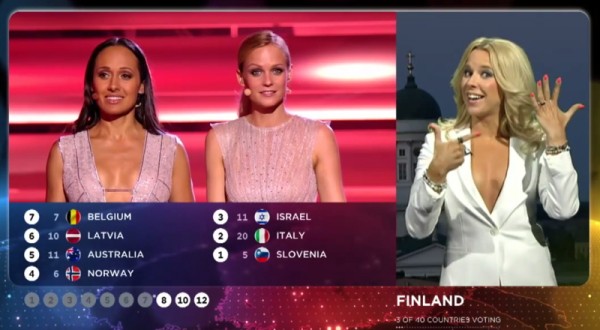How would the new voting process have affected the results of previous years?
With the new voting structure having been announced by the EBU this morning, which you can read more about HERE, we have taken a look at how this new method would have affected the results of previous years.
Since juries were re-introduced to Eurovision, the EBU has provided split points for jury and televote, with the exception of 2013, when the average ranking was given instead. We can use these points to calculate what the results would have been under the new methods.
So what would have changed?
For every year, the winner would have remained the same. Some of the lower positions would have changed around.
- In 2015, Italy (Il Volo) would have finished second and Russia (Polina Gagarina) would have finished third. The United Kingdom (Electro Velvet) would have finished last, and nil-pointers Austria (The Makemakes) and Germany (Ann Sophie) would have finished 23rd and 25th respectively.
- In 2014, the top 5 would have been exactly the same. Poland (Donatan & Cleo) would have risen from 14th to 8th, thanks to a strong televote, and Malta (Firelight) would have risen from 23rd to 13th thanks to the jury vote. Conversely, both Denmark (Basim – 9th to 15th) and Spain (Ruth Lorenzo – 10th to 16th) would have fallen in the rankings due to a poorer televote result.
- In 2012, the whole top 12 would have remained the same, with only lower positions changing, most notably Macedonia (Kaliopi) would have fallen from 13th to 16th.
- In 2011, the top 4 would have been the same with Greece (Loukas Giorkas feat. Stereo Mike) rising from 7th to 5th. The United Kingdom (Blue) would have risen from 11th to 8th thanks to finishing 5th in the televote.
- In 2010, Romania (Paula Seling & Ovi) would have finished second, and Turkey (maNga) would have finished third. Georgia (Sofia Nizharadze) would have risen from 9th to 5th and Belgium (Tom Dice) would have fallen from 6th to 9th.
As for the semi-finals, this would also have affected some of the qualifiers:
- In 2015, Malta (Amber) would have qualified over Azerbaijan (Elnur Huseynov)
- In 2014, Portugal (Suzy) would have qualified over San Marino (Valentina Monetta)
- In 2012, Croatia (Nina Badrić) would have qualified over Norway (Tooji)
- In 2011, Belgium (Witloof Bay) would have qualified over Moldova (Zdob şi Zdub)
- In 2010, Finland (Kuunkuiskaajat) would have qualified over Moldova (SunStroke Project and Olia Tira), and Sweden (Anna Bergendahl) would have qualified over Ireland (Niamh Kavanagh)
From the analysis above, we can assume that the new method of calculating points might seem quite a drastic change, but the effect this will have on the overall result is not that significant overall. The same song would have won each year, which is the most important thing.
The reaction to the announcement has been pretty mixed, but as with all change, there is always some resistance at the beginning. Time will tell if this new voting system works, but at least one thing is certain, the voting will be a lot more exciting than in previous years!


Nice to see some of the countries who would have got through to the final. Suzy should have got through in 2014, so a little disappointed this has come in now rather than a couple of years back…The UK results seem more appropriate with this scoring system 🙂